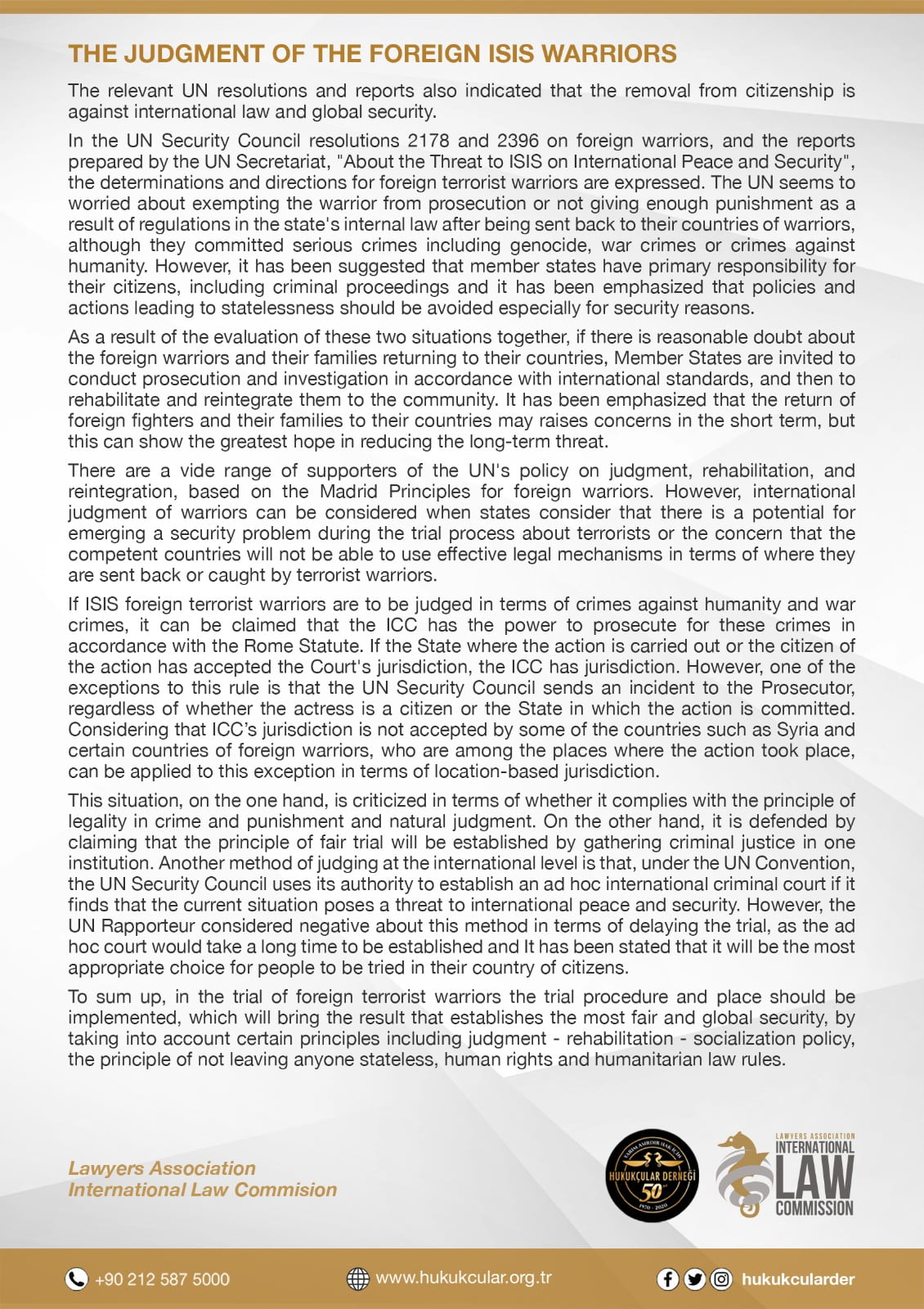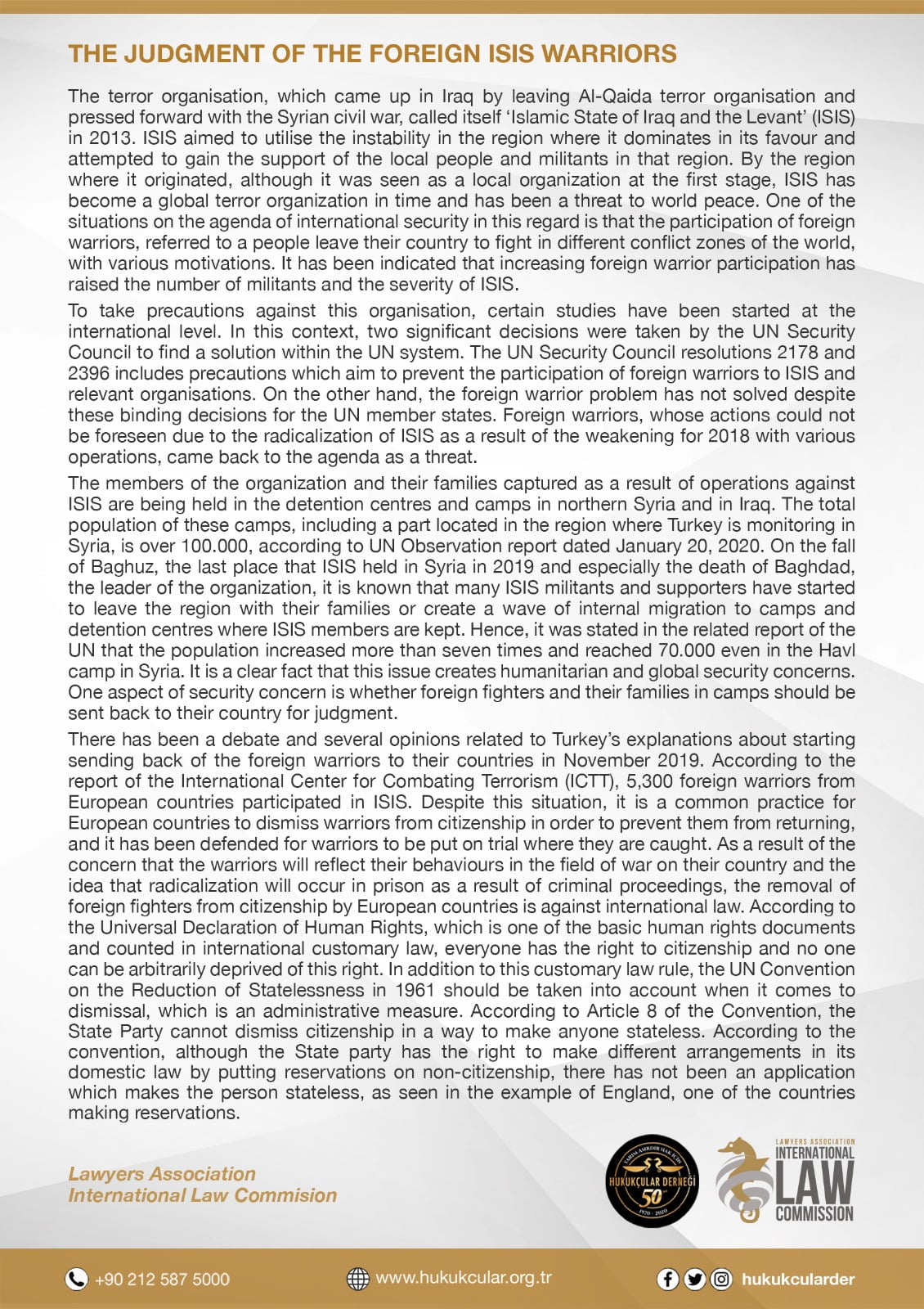
THE JUDGMENT OF THE FOREIGN ISIS WARRIORS
The terror organisation, which came up in Iraq by leaving Al-Qaida terror organisation and pressed forward with the Syrian civil war, called itself ‘Islamic State of Iraq and the Levant’ (ISIS) in 2013. ISIS aimed to utilise the instability in the region where it dominates in its favour and attempted to gain the support of the local people and militants in that region. By the region where it originated, although it was seen as a local organization at the first stage, ISIS has become a global terror organization in time and has been a threat to world peace. One of the situations on the agenda of international security in this regard is that the participation of foreign warriors, referred to a people leave their country to fight in different conflict zones of the world, with various motivations. It has been indicated that increasing foreign warrior participation has raised the number of militants and the severity of ISIS.
To take precautions against this organisation, certain studies have been started at the international level. In this context, two significant decisions were taken by the UN Security Council to find a solution within the UN system. The UN Security Council resolutions 2178 and 2396 includes precautions which aim to prevent the participation of foreign warriors to ISIS and relevant organisations. On the other hand, the foreign warrior problem has not solved despite these binding decisions for the UN member states. Foreign warriors, whose actions could not be foreseen due to the radicalization of ISIS as a result of the weakening for 2018 with various operations, came back to the agenda as a threat.
The members of the organization and their families captured as a result of operations against ISIS are being held in the detention centres and camps in northern Syria and in Iraq. The total population of these camps, including a part located in the region where Turkey is monitoring in Syria, is over 100.000, according to UN Observation report dated January 20, 2020. On the fall of Baghuz, the last place that ISIS held in Syria in 2019 and especially the death of Baghdad, the leader of the organization, it is known that many ISIS militants and supporters have started to leave the region with their families or create a wave of internal migration to camps and detention centres where ISIS members are kept. Hence, it was stated in the related report of the UN that the population increased more than seven times and reached 70.000 even in the Havl camp in Syria. It is a clear fact that this issue creates humanitarian and global security concerns. One aspect of security concern is whether foreign fighters and their families in camps should be sent back to their country for judgment.
There has been a debate and several opinions related to Turkey’s explanations about starting sending back of the foreign warriors to their countries in November 2019. According to the report of the International Center for Combating Terrorism (ICTT), 5,300 foreign warriors from European countries participated in ISIS. Despite this situation, it is a common practice for European countries to dismiss warriors from citizenship in order to prevent them from returning, and it has been defended for warriors to be put on trial where they are caught. As a result of the concern that the warriors will reflect their behaviours in the field of war on their country and the idea that radicalization will occur in prison as a result of criminal proceedings, the removal of foreign fighters from citizenship by European countries is against international law. According to the Universal Declaration of Human Rights, which is one of the basic human rights documents and counted in international customary law, everyone has the right to citizenship and no one can be arbitrarily deprived of this right. In addition to this customary law rule, the UN Convention on the Reduction of Statelessness in 1961 should be taken into account when it comes to dismissal, which is an administrative measure. According to Article 8 of the Convention, the State Party cannot dismiss citizenship in a way to make anyone stateless. According to the convention, although the State party has the right to make different arrangements in its domestic law by putting reservations on non-citizenship, there has not been an application which makes the person stateless, as seen in the example of England, one of the countries making reservations. The relevant UN resolutions and reports also indicated that the removal from citizenship is against international law and global security.
In the UN Security Council resolutions 2178 and 2396 on foreign warriors, and the reports prepared by the UN Secretariat, “About the Threat to ISIS on International Peace and Security”, the determinations and directions for foreign terrorist warriors are expressed. The UN seems to worried about exempting the warrior from prosecution or not giving enough punishment as a result of regulations in the state’s internal law after being sent back to their countries of warriors, although they committed serious crimes including genocide, war crimes or crimes against humanity. However, it has been suggested that member states have primary responsibility for their citizens, including criminal proceedings and it has been emphasized that policies and actions leading to statelessness should be avoided especially for security reasons.
As a result of the evaluation of these two situations together, if there is reasonable doubt about the foreign warriors and their families returning to their countries, Member States are invited to conduct prosecution and investigation in accordance with international standards, and then to rehabilitate and reintegrate them to the community. It has been emphasized that the return of foreign fighters and their families to their countries may raises concerns in the short term, but this can show the greatest hope in reducing the long-term threat.
There are a vide range of supporters of the UN’s policy on judgment, rehabilitation, and reintegration, based on the Madrid Principles for foreign warriors. However, international judgment of warriors can be considered when states consider that there is a potential for emerging a security problem during the trial process about terrorists or the concern that the competent countries will not be able to use effective legal mechanisms in terms of where they are sent back or caught by terrorist warriors.
If ISIS foreign terrorist warriors are to be judged in terms of crimes against humanity and war crimes, it can be claimed that the ICC has the power to prosecute for these crimes in accordance with the Rome Statute. If the State where the action is carried out or the citizen of the action has accepted the Court’s jurisdiction, the ICC has jurisdiction. However, one of the exceptions to this rule is that the UN Security Council sends an incident to the Prosecutor, regardless of whether the actress is a citizen or the State in which the action is committed. Considering that ICC’s jurisdiction is not accepted by some of the countries such as Syria and certain countries of foreign warriors, who are among the places where the action took place, can be applied to this exception in terms of location-based jurisdiction.
This situation, on the one hand, is criticized in terms of whether it complies with the principle of legality in crime and punishment and natural judgment. On the other hand, it is defended by claiming that the principle of fair trial will be established by gathering criminal justice in one institution. Another method of judging at the international level is that, under the UN Convention, the UN Security Council uses its authority to establish an ad hoc international criminal court if it finds that the current situation poses a threat to international peace and security. However, the UN Rapporteur considered negative about this method in terms of delaying the trial, as the ad hoc court would take a long time to be established and It has been stated that it will be the most appropriate choice for people to be tried in their country of citizens.
To sum up, in the trial of foreign terrorist warriors the trial procedure and place should be implemented, which will bring the result that establishes the most fair and global security, by taking into account certain principles including judgment – rehabilitation – socialization policy, the principle of not leaving anyone stateless, human rights and humanitarian law rules.





